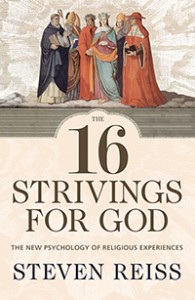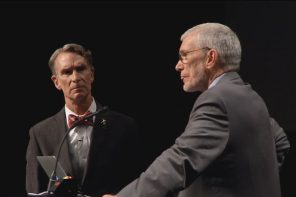For quite some time now, there’s been an irritating trend in the social sciences. In every generation, someone new comes along to explain how all of religion exists in order to satisfy this one particular human need.
The 16 Strivings For God: The New Psychology of Religious Experiences
Steven Reiss
Mercer University Press
(January, 2016)
According to nineteenth-century anthropologist Edward B. Tylor, religion arose to satisfy our curiosity about the universe. James Frazer later argued that, rather, religion indulges humanity’s need to feel like we’re in control. For Freud, religion helps us cope with our fear of death. William James argued that religion was ultimately about our need to experience mystical states of consciousness.
The problem with these approaches is that religion does a lot of different things for a lot of different people. The only way to force religion to fit a single fundamental desire is to make up your own rules about what counts as religion. This has political consequences. On the colonial frontier, for example, this logic was used to dismiss indigenous cultures as backwards, and to claim that what they called religion simply didn’t count.
Enter psychologist Steven Reiss’ new book: The 16 Strivings for God: The New Psychology of Religious Experiences. There isn’t just one fundamental desire behind religion, Reiss argues, there are sixteen of them. According to Reiss, all humans have the following innate desires:
– Acceptance: the desire for positive self-regard
– Curiosity: the desire for understanding
– Eating: the desire for food
– Family: the desire to raise children and spend time with siblings
– Honor: the desire for upright character
– Idealism: the desire for social justice
– Independence: the desire for self-reliance
– Order: the desire for structure
– Physical Activity: the desire for muscle exercise
– Power: the desire for influence or leadership
– Romance: the desire for beauty and sex
– Saving: the desire to collect
– Social Contact: the desire to have fun with peers
– Status: the desire for respect based on social standing
– Tranquility: the desire for safety
– Vengeance: the desire to confront provocations
Religion, he argues, is successful when it serves all of these needs.
Naturally, I was skeptical. Do we really need another theory of religion based on universal human needs? And how, given the diversity of human history and culture, could Reiss claim to have found one core set of desires that apply across all time and space? When the Cubit recently reached out to Dr. Reiss for a phone interview, though, his answers were surprising. We discussed his methodology, potential applications of his theory to secularism, and Reiss’s own spirituality as a scientist.
How does your theory differ from those of past authors that posit just one or two motivations for religion?
Ours is based on scientific research, so we ask people what motivates them. At this point, we’ve assessed the motives of 100,000 people throughout the world, from many cultures in Europe, Asia, and North America. We asked them about every possible thing that could motivate them, and then we take their answers and analyze them statistically. The results show that there are 16 psychological forces that motivate people. All human motives are a combination of these 16 psychological forces. Nothing important is left out. It’s a comprehensive list.
The others, like Freud—he didn’t do any research, and neither did most of the others. They just did armchair speculation and philosophically suggested the fundamental forces. Then they would take one or two and say that was the most important. There was no scientific basis.
Could you walk me through your methodology?
We started off with every goal I could think of [with help from my students]. And then we asked other people to add to the list and think of additional ones. We went through books and the index of psychology to come up with more. The first list had 550+ goals. Then we looked at it, and we thought how many of these are really the same? We wanted to eliminate duplicates. That cut it down to around 300 different goals.
We would show these goals to somebody and ask, “How important is each one in motivating you?” We would get data from a couple hundred people and put that into a computer [to] determine which [goals] were very similar. We would reduce the list further, and then start over with the reduced list, repeating the process until we came up with the 16 desires. From that 16, we can generate almost any goal.
Your model offers some new conceptual resources, particularly for thinking about how people’s “strong” and “weak” strivings inform how they participate in religion.
The 16 desires are shared by everybody. We all want the same things from life. We would all rather understand than be confused. We would all rather be praised than criticized. We would all rather have safety than feel anxious. While we all want the same things, we don’t value them to the same degree. Some people value safety above all else, and they’re going to be looking for God to protect them. That’s going to be the most important thing to them, the most meaningful thing. Somebody else might value understanding even more than their safety, and [for them] the most meaningful thing in religion [might be] understanding where we come from and who we are. For others, religious fellowship may be the most important thing because they place an unusually high value on social contact.
It becomes possible to gain insight into your desires, your values, and how that is expressed in your religion. For most psychologists, the motivations and forces that drive people, they call them “energy.” I’m talking about values. As a species, we’re motivated to assert our values. When we come to understand how we value the 16 desires, you gain insight into why some aspects of religion resonate more with you than others.
Could this be extended to people’s participation in secular communities as well? Is there anything specific to religion about this, or could we apply it more generally to other kinds of collectives?
The 16 desires can help understand the individual in a secular life and in the religious life. You’re born with your values and you’re naturally motivated to express your values, and you look for opportunities to do that. You can do that in secular ways and in religious ways. So religion in a sense competes with secular life for providing people with opportunities to express desires. That’s why it can rise and fall in popularity, because people have free choice. What religious leaders want to do is to address people’s values and to be consistent with their values and to realize that their values are individual.
In the book you argue that spirituality is not one of the 16 strivings.
I don’t use spirituality as an isolated aspect of the human psyche, but as something that is fundamental to everything that is done. So of the 16 desires, the ones you value show spirituality.
I think spirituality has 16 different dimensions. When you choose to live a spiritual life and choose to live a life of faith, that’s when you choose what you value from the 16 desires. That’s your spirituality. Some will say that spirituality is a separate thing and is somehow detached from our desires and our values. It’s a reasonable view, but it’s not my view. I don’t like it because it isolates spirituality in a certain sense. It completely rubs me the wrong way, and what I don’t like about it is that it has an isolating quality where you go to work and that’s one thing and you go to pray and that’s something else. I think that the spirituality should be imbued in everything. That’s just my view.
Do you consider yourself to be a scientist who is also spiritual?
I definitely consider myself to be secular and spiritual. I don’t think there’s such a big conflict between science and spirituality. The point of conflict would be presenting competing understandings; even within science you have competing theories. As the book shows, religion is extremely broad and so is spirituality. It’s not just one thing.
I’m writing as a psychologist, and 90 percent of psychologists believe that religion is about the fear of death. Other than that they have a bribe theory on religion. Stay religious so you’ll live long or something. They’re not telling you to stay religious because God exists. They give you extrinsic reasons why you should be religious: you’ll be healthier, and so forth.
Something that I argue is that religion is not about the fear of death. Fear of death is part of religion. Death is obviously a powerful consideration in the religious, but religion is about so much more than the fear of death. Morality, for example, has nothing to do with psychology or anxiety. I’m trying to show the psychological breadth of religion, a comprehensive addressing of everything.
My own take on your book is that you multiply the number of psychological motivations we can associate with religion, and so you’re offering a much better, more useful set of motivations than the previous theorists of religion whom you’ve mentioned.
Where I’m hesitant is that you claim you’ve found a set of psychological universals, and here’s my reason: we know that culture affects biology, that there’s a give-and-take between our psychology and our environment. Some of our fundamental desires aren’t just biological, but also come from our social milieu. We also know that, across human history, there have been many societies with different sets of values, which have produced very different types of people.
While I think that your book is a sharp and comprehensive look at the 16 motivations in many of the people that you’ve surveyed, I can’t buy that this is universal—that there haven’t ever been places and times where people had very different motivations associated with their culture or religion. How do you respond?
First of all, I think you’ll probably find other people that have a similar reaction. The book does not talk a lot about culture and there are certainly a lot of people interested in that. There’s one deliberate reason for that. Again, as a psychologist I look at endless debates on where [desires] come from, whether it’s culture, biology, psychology, so on. These debates don’t get resolved. What I want to say is that I don’t know where they come from, but I know I can use these desires to promote self-awareness. I know these desires could form a more powerful basis for something like faith-based counseling. I know these desires are new ideas, which is not easy in a field that’s been around for a while. I know if I start talking about culture, I won’t get off the issue. That part is very conscious, very deliberate in the book.
On the other hand, there’s still the question of where do they come from and I really don’t have a lot say in the book about that. I think your comment is valid on that [issue]. But if I had something to say, I would be very afraid that it would draw attention away from what we have and the steps we have taken. That’s another conscious concern of mine.
I’m a non-healthy person so I’m also thinking in terms of how long would it take to do something. If all I was going to do was write about culture in a serious way, it would take me more years than I probably have. So that’s another thought that goes through my mind. I’m very much trying to do what I think I can, and to at least say things that I can, for the most part, back up.
I’m sure the 16 strivings is not the last [version] we’re going to see. I will suggest that while they can be improved on, they’re a heck of a lot better than what other lists have come up with. So you try to take a step forward, and you try to do what you can within the time frame that you have to work.
Also on the Cubit: Does The Science Show that Spirituality Will Benefit Your Child?






